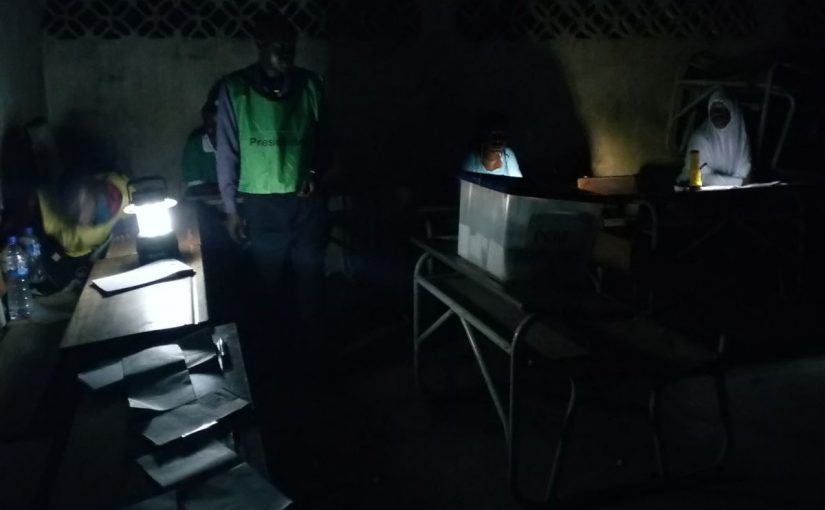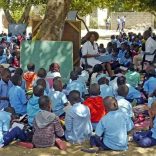Mozambique: Consolidation of democracy requires electoral justice
Nampula: Counting of votes orderly, with few incidents – AIM report

There were no power cuts during the count. Lights out at Namicopo polling station. Photo: Twitter @ntatendana
The atmosphere during the counting of the votes in the mayoral by-election in the northern Mozambican city of Nampula on Wednesday night was generally calm and orderly, although at a couple of polling areas opposition parties did try to gather crowds of supporters to “control the vote”, according to the final report for the day issued by the Joint Civil Society Observation Platform (also known as the “Peace Room”).
There was an attempt to break through a police barrier at a polling area in the Teacane primary school. The police pushed the crowd back, and the situation returned to normal. A second attempt to “control the vote” was made at the polling stations at the Belenenses primary school, where the riot police showed up, but only for a short period.
The report praised the police “which behaved in a neutral manner and accompanied the process without any interference”.
There were no power cuts during the count (in previous elections, opposition parties have claimed that the power was cut off deliberately to hinder the count and facilitate fraud). One local director of the electricity company, EDM, even went to the trouble to contact the Observation Platform to check whether any polling areas were facing electricity problems.
Although there were no power cuts, lighting was a problem in some polling stations. Lighting conditions were poor and the torches provided by the Electoral Administration Technical Secretariat (STAE) gave only feeble amounts of light, leading some polling station members of staff to use personal alternatives, such as their cell phones, to provide more light.
The observers noted that during the day there were repeated problems with voters who had voter cards, but whose names could not be found in the electoral registers. Nobody should be allowed to vote unless their names are on the registers.
This apparent inaccuracy of the registers is a problem that has occurred repeatedly in previous elections, and is a further indication of the careless way in which STAE at local level sometimes works. The voters themselves are not blameless – the registers are always put on public display before the election, precisely to allow voters to check whether their names are on the list.
There were instances of people trying to vote who were clearly not entitled to do so. The independent television station STV, saw citizens trying to vote using voter cards issued in other districts of Nampula province. Since they were not registered as voters in Nampula city, they were not allowed to vote, and their cards were confiscated for further investigation.
Suspicions were aroused when some people tried to take rucksacks into the polling stations. No voter is allowed to carry a bag of any sort into a polling station, for it is alleged that they might carry extra votes that will be slipped into the ballot boxes.
But when the suspect bags were opened, they were found to contain food, clothes and other innocuous items.
A further problem in many polling stations was that STAE had not paid the staff their allowances in good time. Some of the staff had left their homes at 05.00 and had eaten nothing all day. They threatened to go on strike and bring voting to a standstill.
The civil society observers noted that the concentration of crowds seeking to “control the vote” showed a lack of trust in the electoral bodies, which needed to work with the public in order to regain that trust.













Leave a Reply
Be the First to Comment!
You must be logged in to post a comment.
You must be logged in to post a comment.